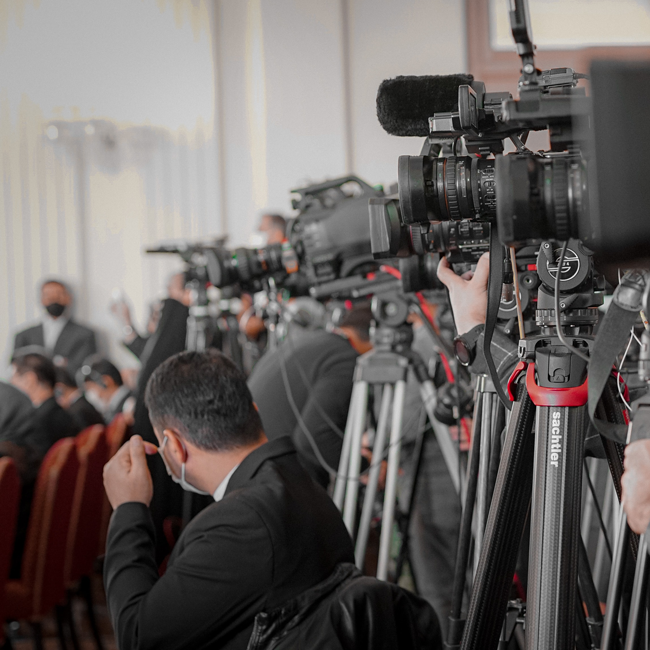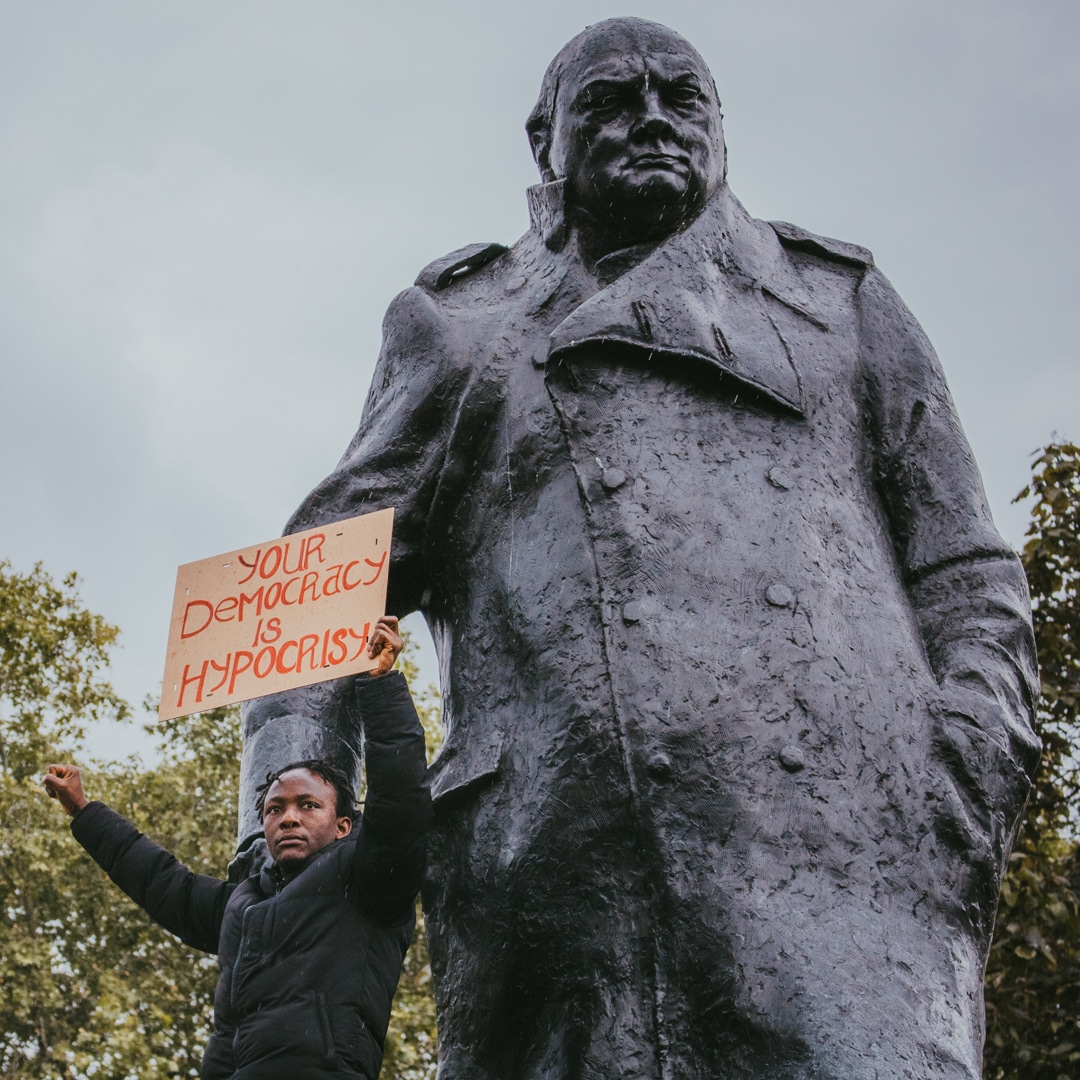We are on the cusp of a brilliant future, only if we choose to embrace it

We are on the cusp of a brilliant future, only if we choose to embrace it
Opinion + AnalysisBusiness + LeadershipPolitics + Human Rights
BY Simon Longstaff 22 JUN 2022
Speaking a couple of days after the 2022 Federal Election, renowned Australian journalist, Stan Grant, noted that although the election of the Albanese government had been a moment of national ‘catharsis’, it was more difficult to discern in the result a commitment to a clear, positive direction for the nation. In that sense, the future shape of Australia remained an ‘open question’.
This was not to deny that the Australian electorate seemed to express, through their vote, a few clear preferences: an end to the debilitating ‘climate wars’, higher standards of integrity in federal politics and more generally, a preference for a more diverse and inclusive form of representation in our national parliament and government.
There is every reason to believe that these expectations will be met. Indeed, one might be encouraged to hope for something more. For example, it was remarkable that the first utterance of Prime Minister Albanese, on claiming victory, was to promise a referendum to enshrine in the Constitution an Indigenous ‘Voice to Parliament’ as called for in the Uluru Statement From The Heart. The surprise in this was that this issue had barely been mentioned during the election campaign – yet had clearly loomed large in the mind of the new PM.
So, what else might we aim to achieve as a democratic nation endowed with the most fortuitous circumstances of any nation on earth? Yes, despite the current ‘doom and gloom’, we are on the cusp of a truly brilliant future – if only we choose to embrace it.
We have everything any society could need: vast natural resources, abundant clean energy and an unrivalled repository of wisdom held in trust by the world’s oldest continuous culture supplemented by a richly diverse people drawn from every corner of the planet. However, whether this future can be grasped depends not on our natural resources, our financial capital, or our technical nous. The ultimate determinant lies in our character.
Three forces can shatter our path to prosperity. First, enemies from without who seek to exploit our grievances and divide our nation into warring factions. Second, a collective fear of the unknown and a lack of trust in those who would lead us there. Third, a lingering, persistent doubt about the legitimacy of a society that violently dispossessed the first peoples of our continent.
Each of these threats can be neutralised – if only we have the collective will and the courage to do so. With this in mind, I have outlined below a set of core, national objectives that I think would secure the endorsement of a vast majority of Australians. It is the realisation of these objectives that will unlock the brilliant future that is available to all Australians.
In five years, we can fashion a society that is at ease with itself and its place in the world. We can have sown the seeds out of which will grow a universal sense of belonging – a gift bestowed by First Nations people who have only ever asked for respect, truth and justice. That sense of unfettered connection, informed by an Indigenous understanding of country that has grown over time immemorial, will be the glue that binds us into one people of many parts. Once established and reinforced, nothing will dissolve that bond.
In five years, we can grow the confidence to embrace radical change – confident that no individual or group will be asked to bear a disproportionate burden while others take an unfair share of the gains. Our commitment to a broadly egalitarian society will move from myth to reality. While we may not all rise to equal heights, no one will be left to fall into the depths of neglect or obscurity. This will allow us to be brave, to take risks and to harvest the rewards of doing so.
In five years, we can be better led. Confidence can be restored in our governments – that they will truly honour their democratic obligation to act solely in the public interest – whether in their use of public resources or in the policies and practices they adopt.
In five years, the aged, the sick and infirm should be cared for by a workforce who are properly valued and rewarded for their support of the most vulnerable.
In five years, all Australians should have a genuine opportunity to make a home for themselves in affordable, secure accommodation.
In five years, everyone should feel more safe and secure in their homes, their workplaces, their cities and towns.
In five years, a confident Australia can build and reinforce enduring alliances with nations who share our desire to live in a just and orderly world free from the heavy yoke of authoritarian governments.
All of this is possible. For the most part our physical and technical infrastructure is world class. Our ethical infrastructure could be better. We need to invest in this area – confident that in doing so we will unlock both social and economic benefits of staggering proportions. As Deloitte Access Economics has estimated, a mere 10% increase in the level of ethics in Australia would lead to an increase in GDP of $45B (yes, billion) every year – not through some kind of ‘magical effect’ but as a direct consequence of the increased trust that better ethics would create.
Do this and we can embrace the brilliant future that beckons us.
With your support, The Ethics Centre can continue to be the leading, independent advocate for bringing ethics to the centre of life in Australia. Click here to make a tax deductible donation today.
Ethics in your inbox.
Get the latest inspiration, intelligence, events & more.
By signing up you agree to our privacy policy
You might be interested in…
Opinion + Analysis
Politics + Human Rights, Science + Technology
Is it right to edit the genes of an unborn child?
Opinion + Analysis
Business + Leadership
Let’s cure the cause of society’s ills, and not just treat the symptoms
Opinion + Analysis
Business + Leadership, Science + Technology
Big tech knows too much about us. Here’s why Australia is in the perfect position to change that
Opinion + Analysis
Health + Wellbeing, Business + Leadership
The ethical dilemma of the 4-day work week
BY Simon Longstaff
Simon Longstaff began his working life on Groote Eylandt in the Northern Territory of Australia. He is proud of his kinship ties to the Anindilyakwa people. After a period studying law in Sydney and teaching in Tasmania, he pursued postgraduate studies as a Member of Magdalene College, Cambridge. In 1991, Simon commenced his work as the first Executive Director of The Ethics Centre. In 2013, he was made an officer of the Order of Australia (AO) for “distinguished service to the community through the promotion of ethical standards in governance and business, to improving corporate responsibility, and to philosophy.” Simon is an Adjunct Professor of the Australian Graduate School of Management at UNSW, a Fellow of CPA Australia, the Royal Society of NSW and the Australian Risk Policy Institute.
You won't be able to tell whether Depp or Heard are lying by watching their faces

You won’t be able to tell whether Depp or Heard are lying by watching their faces
Opinion + AnalysisPolitics + Human RightsRelationshipsSociety + Culture
BY Joseph Earp 2 JUN 2022
The Johnny Depp and Amber Heard defamation trial is now over.
Heard has been found guilty of defaming the actor with an op-ed she wrote – that did not name him explicitly – about being a survivor of domestic violence. Depp’s legal team too has been found guilty of defamation, but the amount that Heard has to now pay Depp is a much higher figure than he has to pay her.
The proceedings are done. But the media reaction to the trial – both from traditional outlets, and the deluge of posts about it crowding every single social platform like ants across an old plate of food – will linger.
This is because, in many circles, the all-too public spectacle has been treated like an unprecedented event. Pored over ad nauseum, it has been subject to endless thinkpieces, YouTube breakdowns, and Twitch streams. Twitter is awash with “fan edits”, compilations of carefully selected moments cut to the jaunty music usually associated with dance trends, or videos of dogs playing with each other in suburban backyards. There’s no use blocking keywords associated with it on social media. Videos still find a way to slip through, because the trial is everywhere.
This isn’t so surprising. The trial is on one level, a glimpse into the personal lives of the usually alien upper class. On another, it is shocking and disturbing enough – whichever side one takes – that it provides the vicious thrills that a culture which has become obsessed with true crime obsessively seeks out. This is all information, content. But how much of it do we need to make an informed decision about the outcome of the trial? And more than that, is this a useful kind of information? Where does it lead us? What does it give us?
The trial is foreign, it’s taboo, it’s ugly, and it’s glossy. What it isn’t, however, is quite as novel as it first seems.
Old Stories; New Faces
Much like the O.J. Simpson trial, or the proceedings against Lindy Chamberlain-Creighton, the Australian woman who claimed a dingo ate her baby, the Depp/Heard case is an example of a media-captivated society channeling abstract arguments through the lens of a high stakes legal proceeding, populated by faces that viewers have already developed complex parasocial relationships with. And, importantly, in each case, there has been an intense public scrutiny on how the figures in these cases should act – a fixation on their body language, their expressions, and the way they sound out words.
During the Simpson trial, the abstract arguments at play concerned race relations. Now, the tensions underlying the Depp/Heard trial are to do with what is sometimes referred to as our “post-metoo world”, a culture that has seen abusers reckoned with, and vast systems of deception that protect those abusers brought to light.
All of these court cases represented, and now represent, an opportunity for the public at large to discuss topics they might not normally have considered polite to bring up at the dinner table, or around the water cooler. “Is O.J. guilty?” was a way of saying, “tell me what you think about race and class in this country.” “Is Amber Heard a liar?” is now a way of saying, “what do you think abuse looks like? And what do we do about it?”
But there is at least one way that the Depp/Heard trial is involved with a trend that is breaking new ground. Unlike the Simpson trial, or the case against Chamberlain-Creighton, most viewers are watching the case through the internet. In turn, that means viewers have a unique ability to craft their own content about the proceedings, filtering key moments pulled from hours of footage through whatever pre-existing narrative they have constructed about the hero and the villain of this painful, and very sad story.
These content creators, who are often cutting together their videos in their spare time for no gain except rallying their audience around them, can watch over the trial’s footage as frequently as they like. They can scrutinize the same few seconds over and over; slow stretches of it down; freeze them in place.
In turn, that has turned a growing number of these amateur video essayists into amateur psychologists. A large subset of Depp/Heard content creators have come to believe that they can work out which of the players are lying by closely watching their expressions, unpacking their body language, and picking over the slightest tic, or absent gaze. For these sleuths, the case’s conclusion is as clear as Heard’s grimace, or the smile unfurling in the corner of Depp’s lips.
The Face Of A Liar
Those who seek to excavate the “truth” hiding beneath the trial by studying the body language and facial expressions of Depp and Heard start from a justifiable philosophical position. It was the philosopher Baruch Spinoza, a famous monist, who believed that every bodily state is underwritten by a mental state. For Spinoza, all things are of the one matter – variously called “nature”, or “God” by his intellectual interpreters. On this view, there is no distinction between any two substances, let alone a distinction between the way we hold ourselves, and what we think. The mind is the body, and the body is the mind.
From this starting point, it makes some sense to believe that the flesh might hold some insight into the secret thoughts and desires of two people who are very famous and very rich – and thus largely inaccessible, because nothing buys privacy like money and influence. Or, if not insight, then evidence gathered as post-hoc justification. Decisions as to guilt change based on a variety of factors – but they’re sometimes made early, and data can be gathered after those decisions have already been made, propping up pre-existing positions.
The mistake, however, is to generalise what these embodied states look like, and thus to generalise the emotional and mental states they are tied to.
There is, quite simply, no one way that all of us look when we lie, or are distressed, or happy. We are distinct in the way that we consider the world around us, and thus distinct in the way that we physically appear when we do.
Many of the “tell-tale signs” that get neurotically returned to, over and over again, on social media – Heard’s tone of voice, Depp’s drawl – could have any number of associated affective states, from anxiety, to pain, to yes, perhaps, the desire to lie. “It can be tough to accurately interpret someone through their body language since someone may feel tense or look uneasy for so many reasons,” said the therapist and author Dr. Jenny Taitz.
If we follow Spinoza, we will believe that our bodies and our thoughts are intertwined – but that’s not the same as saying the former will reveal the latter. These are slabs of affect, expressed both physically and mentally, but they are not as easily comprehensible as that makes them sound.
Indeed, psychological studies have proved for decades that none of us are skilled when it comes to weeding out those spinning “falsehoods”, and those not. A 2004 study of lying found that “agents of the FBI, the CIA and the National Security Agency – as well as judges, local police, federal polygraph operators, psychiatrists and laymen – performed no better at detecting lies than if they had guessed randomly.”
There is, after all, an immense social advantage to picking liars. If we could do it, and do it reliably, then that would be an invaluable skill, one we would expect to spread and be adopted across communities quickly. The fact that there is no dominant method of analysing the way our bodies twist and pose when speaking in itself speaks to the impossibility of using faces to get at what we mean when we talk about “the truth.”
Moreover, even most “body language experts” – an increasingly popular and media-saturated sub-set of pop psychologists, who have almost no science to back up their claims – admit that we need to get a baseline of our subject’s physical reactions before we can even attempt the fraught and mostly doomed work of trying to understand if they’re lying.
Which is to say, we need to at least know what people look like when they’re telling the truth before we can tell if they’re not. And we don’t know Johnny Depp, or Amber Heard, despite the illusion of closeness granted by social media. We don’t have enough data about how they move through the world, or what they look like when they do. How could we possibly guess at the motives and thoughts of utter strangers?
The Actors
Heard’s critics in particular have developed the line that she is a “performer”, going through the mere motions of grief and trauma – and not particularly well. They highlight a moment in which Heard appeared to pause while waiting for a cameraperson to snap a picture of her pained face, and another in which she seemed to flicker, composing herself for her next line as an actress on set would.
Of course, Heard is performing, on some level. But she is not performing in a way different to Depp. Though his defenders do not often note it, he too is signaling to the cameras, and to the jury – his smiles, and asides to his legal team, make that clear.
Nor, even, are these two distinct from the rest of us. We are all performing. We are social creatures, who have the ability to tell when we are being watched by others. Theory of mind, the term used to describe our understanding that other human beings see and think like we do, means that we can throw ourselves into the perspective of our observers. We do this constantly. It is part of what it means to have a body, and to be a person.
As philosopher Jean-Paul Sartre pointed out, we don’t even have to be actively watched to know that we could be watched. We carry with us the sense that we are what Sartre called a “thing in the world” – an entity that, at any time, could be stumbled across, and studied. As a result, we are always aware of ourselves, and how we might appear. Even when we are totally alone, we are never really alone. We are always with others – whether they’re flesh and blood observers, or ones we’ve made up in our head.
Where The Truth Lies
None of this has been an attempt to argue that Depp is telling the truth over Heard, or vice versa. It is not even a question of “truth”, as that word has been contemporaneously used.
The binary between the “real” and the “fake”, aggressively emphasised in media reactions to the trial, is itself overly simplistic, an outdated harbinger dangerously trickled down into the culture by analytic philosophy.
That is not to diminish the hurt, or the trauma, that clearly sits at the centre of the trial. That pain is real. That pain can be understood, but only when we look at the evidence in totality – the actual evidence, not the faces on the stand – and then causally tie it to certain parties.
We should, however, remember there is no objective state of affairs – no perfect place from which, like God, we can dispel the lies and embrace the world as it really is. The judge overseeing the Depp/Heard trial is not neutral. None of us are. At best, in this case as in so many others, we should, like the great pragmatist Richard Rorty, argue for ethnocentric justification for our claims, rather than tying them to a standpoint that sits outside of history, and belief, and bias. In doing so, we can embrace the changeability of our own positions – not on guilt and innocence, exactly, but the societal pressures that are so at play here – and examine them, seeing them as the flexible systems of thought that they are.
Throughout, however, we should remember that whatever we’re looking for when we hope to untangle a messy and painful relationship between two strangers who we will almost certainly never meet, it will not be found in their faces.
Ethics in your inbox.
Get the latest inspiration, intelligence, events & more.
By signing up you agree to our privacy policy
You might be interested in…
Opinion + Analysis
Politics + Human Rights
Lies corrupt democracy
Opinion + Analysis
Politics + Human Rights
Is the right to die about rights or consequences?
Opinion + Analysis
Relationships, Society + Culture
The problem with Australian identity
Opinion + Analysis
Society + Culture, Politics + Human Rights
‘The Zone of Interest’ and the lengths we’ll go to ignore evil
BY Joseph Earp
Joseph Earp is a poet, journalist and philosophy student. He is currently undertaking his PhD at the University of Sydney, studying the work of David Hume.
We're being too hard on hypocrites and it’s causing us to lose out

We’re being too hard on hypocrites and it’s causing us to lose out
Opinion + AnalysisPolitics + Human RightsRelationships
BY Dr Cressida Gaukroger 19 MAY 2022
Everyone hates a hypocrite. And apparently they are everywhere.
In the last week alone British Labour leader Keir Starmer has been accused of hypocrisy for having a beer and curry with colleagues in violation of lockdown rules; feminist social commentator and writer (and election candidate) Jane Caro has been labelled a hypocrite for advocating action on climate change, but also flying a lot; teal independents have been called hypocrites for their sources of funding after criticising Australia’s donation rules; the president of the Solomon Islands has accused Australia of hypocrisy for criticising their security pact with China while pursuing its own AUKUS agreement…
Hypocrisy is a sin regularly and loudly identified in politics and the media. And not without cause. However, this discourse regularly goes too far, to no good end.
We should be less critical of hypocrisy. Our obsession with hypocrisy prevents us from engaging in reasoned debate, it robs us of the tools to identify and express what others are doing wrong, and it risks leading us and others to becoming worse people.
What is the problem with hypocrites?
Though the term ‘hypocrite’ is often used as a catch-all term of moral condemnation, vaguely pointing to people whose actions appear to be inconsistent with their words, it is worth distinguishing between different types of hypocrites.
First there are insincere hypocrites – people who lie to gain advantage. Their actions, however, reveal that they genuinely do not hold the convictions they espouse. They are intentionally mis-leading and using others. Which is particularly egregious when they hold significant power over others as is in the case of politicians. But note that, here, the lying and manipulation are typically far more serious offences than the inconsistency and hypocrisy.
There are also exceptionalist hypocrites – those who make or police rules which they have no qualms about violating themselves. At the heart of it, this feels really unfair. However, it is not a universal wrong. Think of parents who make rules for their children that they do not follow – “you are not allowed to drink”, they say, while nursing a glass of wine; “it is always wrong to lie”, they say, while putting out mince pies for Father Christmas.
Such exceptionalist hypocrisy can sometimes reveal a greater wrong, or potential for wrong. For example, Boris Johnson made laws that kept large parts of his country in lockdown, but was breaking social distancing rules and attending parties. His actions demonstrated a lack of respect for others and, importantly, for those people whose interests he is meant to represent. The hypocrite hater could also point out that Johnson’s actions likely contributed to less adherence to the rules as people looked at his actions and felt “if he gets to do that, why shouldn’t I?”. However, modelling bad behaviour can encourage bad behaviour in others whether or not it is exhibited by a hypocrite. In this respect, the hypocrisy does not worsen the situation.
And then there is the weak-willed or inadvertent hypocrite. This person fails to live up to their espoused rules or ethical principles, not due to malice or deep insincerity, or because they think the rules don’t apply to them, but because it can be hard to be really good all the time. Think of the Christian who believes in the sanctity of marriage but finds themself desperate to leave a loveless marriage. The animal rights advocate who cares passionately about protecting native wildlife, but can’t bring themself to give up their beloved cat that steadfastly resists being kept indoors.
Inadvertent hypocrites may do better to reflect on their own experiences of struggle before harshly criticising others for not living up to their principles. But if they are unempathetic or overly aggressive in their attacks on others who violate their ethical rules, isn’t that the greater crime than not fully living up to those rules themselves? Wouldn’t that be problematic whether or not they lived according to those rules? And is it unempathetic of us to demonise the inadvertent hypocrite for an understandable weakness of will?
We shouldn’t just dismiss hypocrites
As soon as someone is called a hypocrite we feel licence to ignore them. But just because someone is bad, that doesn’t mean what they are saying is incorrect. Rather than shutting hypocrites down it is rational to ask if their hypocrisy is relevant to their argument.
Consider the smoker suffering from lung cancer who tells young people not to smoke because it can ruin their lives. Is their testimony any less reliable because they did not listen to their own advice? Or an environmental activist who flies to climate action conferences. Does this mean that they are any less right when they say we need to take action on climate change?
Our focus on hypocrisy can distract attention from the real issues or moral problems with a person (or institution) or their actions, such as: Are they lying to or manipulating people? Are they showing that they don’t respect the people they are meant to represent? Are they being aggressive or unsympathetic to others? Are they espousing something false or acting in a way that is morally wrong – whether or not their actions and words match up?
This should not dissuade people from rationally engaging in discussions with others about whether their moral principles are consistent. Highlighting ethical inconsistencies is the bread and butter of contemporary moral philosophy. If holding one principle should entail another but your friend holds the first while rejecting the second, talking through this can shed light on their values: help them realise the connection between the two. But throwing around the term ‘hypocrisy’ when you do it can turn a potentially neutral observation that they should reflect more on whether their ethical principles are consistent (shouldn’t we all?) to simply telling them that they are bad.
Being inconsistent is better than being consistently bad
A hypocrite says one thing and does another: so at least they are getting something right. Would we prefer someone who is all bad?
An obsession with hypocrisy can lead us to expect moral perfection in everyone. But inconsistency is part of moral life. There is nothing wrong with having high moral standards while recognising that we won’t always meet them.
Our desire for consistency can lead to unachievably high expectations that, when unmet, lead us to rejecting an entire principle or endeavour rather than living with our moral imperfections and trying to gradually improve our actions next time. Like the dieter who fasts for a week and then immediately gives up because of one slip with a slice of cake, or the long-time vegetarians or vegans who returned to eating meat after an extended stint in a country where vegetarian options were extremely limited. It is not surprising that they broke with their vegetarian principles while in those countries. It may well have been inconsistent with the view that all else being equal it is wrong to eat meat, but that makes it no less understandable an action to take. Rather, it is surprising that they continued to eat meat once they returned to a country where vegetarians were once again well catered for. Their actions changed first and their values followed. They ended up being more consistent perhaps, but (at least for those who believe that it is wrong to eat meat) things went the wrong way.
We are all hypocrites sometimes. The desperate desire to avoid hypocrisy can lead us to strive to be all good and, when that fails, to be all bad, rather than trying to be ‘good enough’ – being guided by moral principles we will likely never fully live up to.
My recommendation is to take it easy on hypocrisy. If you are in a debate, attack arguments not people. Where people are bad the wrongness of their actions or words should speak for themselves, and you should focus on pointing out the actual problem with them, rather than using a catch-all term. When it comes to yourself it may also help to start by aiming for the good, not the perfect. Improving incrementally is still improvement, even if it sometimes means you will be inconstant.
And if all of that doesn’t convince you, then you better hope that you have never exhibited inconsistency in your own principles and your actions. Because if you have, judging others for being hypocritical would be, well, very hypocritical of you.
Ethics in your inbox.
Get the latest inspiration, intelligence, events & more.
By signing up you agree to our privacy policy
You might be interested in…
Explainer
Relationships
Ethics Explainer: Love and morality
Opinion + Analysis
Health + Wellbeing, Relationships
Ethics Explainer: Naturalistic Fallacy
Opinion + Analysis
Relationships, Society + Culture
What does love look like? The genocidal “romance” of Killers of the Flower Moon
Big thinker
Politics + Human Rights, Relationships
Big Thinker: Aristotle
BY Dr Cressida Gaukroger
Dr Cressida Gaukroger is a former lecturer in Ethics at Oxford University now a Senior Policy Advisor focusing on wellbeing-led approaches to government.
Housing affordability crisis: The elephant in the room stomping young Australians

Housing affordability crisis: The elephant in the room stomping young Australians
Opinion + AnalysisBusiness + LeadershipPolitics + Human Rights
BY Intifar Chowdhury 16 MAY 2022
Affordably housing its peoples is a hallmark of a developed society. Yet, Australia’s housing system has been failing young people, argues Intifar Chowdhury.
Squeezed by rising rents and aggressive increase in property prices, young Australians are increasingly being locked out of the housing market, and thus are being denied the stability and financial security that was taken for granted by previous generations.
The housing affordability crisis deepens as inflation, cost of living and housing prices rise at a faster rate than wages. Similarly, Australia’s rental crisis worsens with natural disasters such as flooding and increased competition as the country reopens to international students.
The backdrop to the COVID-19 pandemic will also exacerbate this growing economic inequality across generations. In fact, those in their late 20s and early 30s have now known two crises: the Global Financial Crisis (GFC) of 2008-2009 and the COVID-19 crisis of 2020-2021. This puts them at unique risk and financial disadvantage compared to other members of society.
The reality on the ground is that, compared to their parents and grandparents, today’s young people are not only poor homeowners but also poor renters. The reality is an intergenerational theft.
While some have argued that housing should be at the front and centre of the upcoming federal election, housing affordability has not taken on a sufficient degree of importance in the policy narratives of the two major parties.
In fact, I’d agree that young Australians have been betrayed by both parties. Although the youth need a proper national plan for housing affordability and supply, their situation is sometimes met with rather condescending comments from the political leadership.
Prime Minister Scott Morrison’s comment – that “if you can’t afford rent, buy a house” is both comical and disturbing at first reading. As the PM flaunted in the first 2022 leader’s debate, first home buyer loan schemes allowed 160, 000 Australians to gain access to the property ladder last year. And his recent proposal to allow young people to tap into their superannuation has a similar ambition.
But what he neglects is how housing affordability concerns 67 per cent of Australians, many of whom are young people with low wealth and heavily taxed incomes. And government subsidies for a relative minority put upward pressure on prices for the many, presenting a trade-off of where it is more difficult to save a deposit for a home. Therefore, such comments are disturbing reflections of how far removed Australian political leaders are from the reality on the ground.
Housing affordability: a sticky problem?
Housing unaffordability has been identified as a pressing problem for more than decade now, so why then does it remain unresolved? The simple answer to this is that the politics around the problem prevents a permanent solution.
The housing affordability crisis persists because of two political reasons. First, more voters have an incentive to maintain the status quo compared to those who could benefit from a more equitable housing system. Although the growth in property prices entrenches economic inequality, it is a positive for incumbent homeowners who want to capitalise on their investment.
Further, impenetrable, cumbersome and ambiguous policies spook those with property. They fall into the status quo bias. For example, Labor’s 2019 election slogan to tone down investment incentives and introduce the housing tax upset property and construction industries and offended a large constituency of property owners. These radical proposals cost Labor the election.
Existing housing policies also fail to address the root cause of the problem. Most efforts to deal with unaffordability aim to cool housing demand rather than increasing supply. Pete Wargent, co-founder of BuyersBuyers, believes this approach would “make a marginal difference to affordability over time”.
Although investment incentives like CGT discounts and negative gearing are touted as the key drivers, recent review of six economic papers revealed that the combination of both contributed only a small 1 per cent to 4 per cent increase in dwelling prices. Whereas zoning restrictions, which limit the supply of land on which to build homes, contribute to almost half the rise of average detached house prices in major metropolitans, like Sydney and Melbourne. Centre for Independent Studies’ chief economist and a former RBA official, Peter Tulip, suggests increasing supply and lifting zoning restrictions can have huge benefits.
Yet, these are difficult to attain. The politics of improving housing affordability is determined by whether there are more voters who are property owners than not.
That is, whether there are more beneficiaries of unaffordability who will vote in their self-interest and support policies and parties that will keep prices high and rising, even if that compromises the future security of young people.
According to the Australian Electoral Commission, in 2022, there are 4.2 million voters aged over 65 compared to 3.1 million voters under 29. That is a difference of 1.1 million between lightly taxed, asset-rich older Australians, and younger wage earners. This intergenerational inequality is therefore a function of the classic headlock between the older haves and the younger have-nots.
Simple fix: increase supply?
Housing unaffordability is a complex structural issue that can’t be viewed through a simplistic lens.
Despite a plethora of issues influencing the housing market, the imbalance in supply and demand is at the crux of the matter. Rather unsurprisingly, the Property Council of Australia, recommends major parties to address supply shortages to improve affordability.
But adequate supply of housing doesn’t just mean constructing a certain number of dwellings on greenfield sites. It needs to be well-located and well-serviced with job, social and community infrastructures.
At both federal and state level, more commitment is requited to increase urgent need for more social housing. With a historically low level of social housing, (i.e. a non market rental housing sector), this would be more affordable and secure for low-income earners. Both major parties, however, fall short on public housing investment this election.
Supply of affordable housing can be increased by institutional investments, but investors show relatively little interest in affordable housing largely due to perceptions of risk and comparatively low returns. This is where government incentives and the introduction of some form of financial instrument (similar to the discontinued National Rental Affordability Scheme) could work.
However, evidence from Europe and Britain, suggest that government intervention may decline as affordability worsens. There is a major challenge to rolling out reforms: homeowners want to protect their properties from being undermined by growing housing supply, resulting in less support for government intervention. This feeds into inequality.
Another option is rent control. But opponents suggest that more limitations in the rental property make owning far less appealing. This again points to the headlocks between homeowners and renters; as the classic adage from former PM John Howard goes: no one is complaining in the streets about their house value going up.
Under the current structure, young people are common losers of the housing system. A change in government won’t be a silver bullet for housing affordability in Australia. What is needed is a structural change which is hard to attain given competing interests, imbalanced power and wealth dynamics among stakeholders.
Explore the role that ownership plays in our lives. Join Executive Director of The Ethics Centre Dr Simon Longstaff AO for The Ethics of Ownership on the 17th of August 6:30pm AEST. Tickets on sale now.
Ethics in your inbox.
Get the latest inspiration, intelligence, events & more.
By signing up you agree to our privacy policy
You might be interested in…
Opinion + Analysis
Politics + Human Rights, Relationships
We’re being too hard on hypocrites and it’s causing us to lose out
Opinion + Analysis
Business + Leadership
Roshni Hegerman on creativity and constructing an empowered culture
Opinion + Analysis
Business + Leadership
360° reviews days are numbered
Opinion + Analysis
Politics + Human Rights
You’re the Voice: It’s our responsibility to vote wisely
BY Intifar Chowdhury
Intifar is an Associate Lecturer at the ANU School of Politics and International Relations. Her doctoral research tackles the important question of whether young people are turning away from democracy. Her political commentary on the engagement of young people in politics and issues affecting youth voters has been published in The Conversation, ABC, The Guardian, The Canberra Times and ANU's Policy Forum.
Antisocial media: Should we be judging the private lives of politicians?

Antisocial media: Should we be judging the private lives of politicians?
Opinion + AnalysisPolitics + Human Rights
BY Isabella Vacaflores 13 MAY 2022
The footage was grainy, but the man stepping out of the gay sex club was easily recognisable.
David Campbell, then transport minister of the New South Wales Government, was outed in the evening news, prompting his resignation the following day. His sexuality was the subject of intense media coverage, not least because of the impact it would have on his wife and children.
As headline grabbing and salacious as such personal scandals might be, one might question whether we should have the right to know about the private lives of politicians in the first place. After all, the fact of being queer alone bears little relevance to one’s ability to speak for their constituents, therefore arguably falling outside the realm of the public interest.
Yet, the journalist who broke the story felt differently, noting that the politician in question had “purported to be a family man”. As such, some might see this as an act of exposing hypocrisy, speaking to a deeper issue of character that is highly problematic for representative democracy.
So when it comes to dealing with information about the private lives of public officials, how morally justified are we in caring about what is done outside of parliament?
When rights collide
Although privacy is beneficial for human well-being and flourishing, it is not unequivocally good because such a claim can equally be used to hide information. This poses a significant threat when we consider how the personal lives of those wielding political power might influence their decision-making abilities, negatively impacting those that they claim to represent.
This tension between the claims to privacy of public officials and the rights of the public and the media to freedom of information is an undeniably hard one to resolve.
On the one hand, the revelation of Gladys Berejiklian’s relationship with Daryl Maguire and her subsequent resignation over accusations of corruption vindicate the idea that we should hold the private lives of politicians under constant scrutiny.
Yet, on the other, the case of David Campbell highlights the murky waters in which public interest claims lurk, with a person being pressured to end their political career over a seemingly inconsequential fact about their personal lives.
Are we morally justified in paying attention to and seeking out private information about public officials? After all, prima facie, all individuals have morally and legally robust claims to privacy.
Nevertheless, we generally consider it reasonable for interviewers to enquire about a potential employee’s prior working history to ensure that they are a good fit, or for a detective to ask someone questions about their private life to solve a crime. This is because privacy can and sometimes should be forfeited (with our knowing consent) for other rights or purposes, such as safety and transparency.
On a similar note, many citizens would see certain information about the private lives of politicians as relevant to their decision of who to vote for. This interest is warranted because public officials attain their legitimacy and authority from being entrusted to represent their constituents.
Ultimately, serving in government is ethically demanding – to avoid the corruption of power, we must elect individuals who have a track record of not abusing such privileges. According to the perpetually relevant ‘unity of virtues’ theory of the ancient Greeks, individual morality exists across both public and private spheres of decision-making.
As such, an absence or excess of good behaviour in one’s personal life may be illuminating with regard to professional conduct.
For instance, the media has recently reported that Boris Johnson, in his previous job as a motoring correspondent, accrued over £4000 in parking tickets. This fact, whilst seemingly trite, implies a historical pattern of rule flouting behaviour by the British Prime Minister, suggesting that we ought not be surprised by his involvement in the Partygate scandal.
Such cases highlight the often-blurry public/private divide and justify why we might look to politicians’ personal lives for clues as to how they might fulfil their moral duty to represent their constituents and their interests – even if this conflicts with their own.
Social media and the personalisation of politics
Furthermore, many politicians willingly open themselves up to public scrutiny by using their personal virtues and achievements to appeal to voters. We need not look further than Scott Morrison’s Twitter and Facebook feeds, which regularly feature pictures of the politician cooking up a curry in Kirribilli House and donning blue in support of the Cronulla-Sutherland Sharks, to see how political figures selectively reveal aspects of their private life to project a likeable image.
For as long as public officials advertise themselves and attack others on the basis of irrelevant personal characteristics and decisions (see criticisms recently directed at Anthony Albanese for everything from his weight loss efforts to having a “quiet week” of campaigning despite being in isolation for Covid) they cannot also claim to be innocent victims of the press, particularly when journalists are merely reporting on these assertions.
Nevertheless, politicians often resort to the refrain that ‘the media goes too far’ to divert attention away from their more questionable acts. When it was revealed that self-proclaimed family man and current Deputy Prime Minister Barnaby Joyce was having an extramarital affair with a staffer, a formal complaint about news coverage of the incident was made despite the couple accepting $150,000 to do a tell-all interview about it on live television.
The omnipresent pressure for news outlets to turn a profit leads them to sensationalist reporting and a rather liberal stance as to what information falls into the purview of the public interest.
However, political journalism acts as an irreplaceable check on power, and we ought to be wary of solutions that involve stifling it more than it already is under Australia’s extremely rigid defamation laws.
Towards a better discourse
Instead, content relating to the private lives of politicians needs to be understood in terms of its relevance to their ability to execute their role. We should actively dismiss and avoid searching for details that tell us nothing about the honesty, accountability, competence, integrity, judgement, and self-discipline of a public official, no matter how salacious. However, we can feel justified in pursuing information that reveals their historic performance in such areas.
Admittedly, this is a long laundry list that leaves few areas off-limits. It is important to note here that judgements about protected characteristics alone – such as race, sexuality, religion and gender – are not morally acceptable ways in which to judge the competence of an individual, as established under anti-discrimination laws.
That said, we cannot shy away from investigating how public officials have acted when they thought nobody was looking, particularly when such actions reveal how they use (and abuse) power or contradict their espoused values.
Because the relevance of this information can only be ascertained once it has been made publicly available, there will always be some politicians that have their privacy unjustly violated. This is a trade-off that can be easily defended when we consider the immense number of people that benefit from having a government composed of honest and accountable representatives.
Additionally, anyone entering a public-facing role knowingly places their privacy in a position of vulnerability. If they have something to hide, politics is probably not the place for them, practically and principally speaking.
Furthermore, we can limit the collateral damage of this proposal by encouraging journalists to prioritise reporting on facts that expose political corruption and speak truth to power. By choosing not to indulge in amusing but inconsequential gossip about the private lives of politicians, we can help change the incentive structure of the media system whilst simultaneously promoting enlightened attitudes towards sex and other areas of intense, but often illegitimate, public interest.
The democratic function of the press falters when trivial details about the lives of politicians consume all the resources of our finite attention economy. As such, it is a moral imperative for news outlets to maintain strong ethical standards when it comes to their reporting on the private lives of politicians, focusing their coverage on that which is relevant to their ability to bear office.
Finally, as public ethicist Patrick Dobel writes, “we should judge as mortals judging other mortals”. Public officials are not perfect people, but if they can recover from a fall from grace by regaining trust and legitimacy in the eyes of the people then we should leave them (and their sex scandals) be.
Ethics in your inbox.
Get the latest inspiration, intelligence, events & more.
By signing up you agree to our privacy policy
You might be interested in…
WATCH
Politics + Human Rights
James C. Hathaway on the refugee convention
Opinion + Analysis
Business + Leadership, Politics + Human Rights, Science + Technology
Not too late: regaining control of your data
Opinion + Analysis
Politics + Human Rights
Nurses and naked photos
Opinion + Analysis
Politics + Human Rights, Relationships, Society + Culture
The ethics of tearing down monuments
BY Isabella Vacaflores
Isabella is currently working as a research assistant at the Global Institute for Women’s Leadership. She has previously held research positions at Grattan Institute, Department of Prime Minister & Cabinet and the School of Politics and International Relations at the Australian National University. She has won multiple awards and scholarships, including recently being named the 2023 Australia New Zealand Boston Consulting Group Women’s Scholar, for her efforts to improve gender, racial and socio-economic equality in politics and education.
A foot in the door: The ethics of internships

A foot in the door: The ethics of internships
Opinion + AnalysisBusiness + LeadershipPolitics + Human Rights
BY Althea Kuzman 2 MAY 2022
It’s just to get my foot in the door, I tell myself for the fifth time today as I offer my brain, my degrees and time to someone for free.
It’s a phrase that I’ve always found to be so incredibly visceral. I picture a door just about to slam shut in my face, that I have to hastily shove my foot in before it swings to a heavy close. Or a door that is slightly ajar, an unknown little me comes knocking and I have to slip my foot in and pry the thing open – to beg for an opportunity.
A foot in the door to do tasks which by now should be compensated. Because somehow in my years of trying to find a suitable job, no-one deems my skills to be transferable.
None of these scenarios really paint a picture for a healthy work foundation.
One would think that multiple arts degrees and years of casual jobs following instructions, would qualify me for an “entry level position”.
But it doesn’t. It leaves me cold emailing organisations, asking if they can send their off cuts to me so that I can get exposure. So that I can build a portfolio. So that I can earn a living and build my career.
But in my thinly veiled bitterness I digress. I chose the arts. I chose the creative field where getting your foot in the door is seen as a ‘privilege’. Having worked actual entry level jobs such as gallery host, our role was held up on a pedestal, yet we were not. We were made to simultaneously feel so lucky to have this job and yet so small and very replaceable. Why? Well, because it looks so good on the CV.
But in reality, it hasn’t really done anything to help my long-term career. And while I’ve had some wonderful bosses who have helped mentor me to learn and grow, this no longer seems like valid proof that I can, in fact, progress my career. It also doesn’t help that the pandemic cut arts positions in half.
The issue that lies here is often the refusal in hiring processes to acknowledge transferable skills. Which leaves you wondering, where do you gain these industry specific skills if no one will hire you for entry level jobs? Internships, of course.
Internship or Indenture?
Internships are fascinating mostly because of their prevalence, lack of regulation and lack of overall purpose. A report for the Fair Work Ombudsman by Adelaide Law School in 2013 states that “In Australia, as elsewhere, the term ‘internship’ is without fixed content. It has a broad and uncertain meaning covering everything from unpaid or paid entry level jobs to volunteer work in the not-for-profit sector”. This covers such a breadth of options that no wonder those starting out in their careers can fall into the trap of being exploited.
Internships are rife, particularly in the arts and on a global scale. Note when referring to the arts I include any creative industry, because they all bleed into each other – skills intersect and majority of skills learned are transferrable. There would be no issue with internships… if they were paid, but they rarely are.
In the UK, Sutton Trust is a non-for-profit organisation that fights for youth social mobility. Their work spans research on the prevalence and the social impact that internships have on recent graduates or those looking to change their career. Their 2018 report found that that 86% of arts internships are unpaid. The issue with unpaid internships is that life isn’t free.
Putting numbers on this, to live in London for a month whilst doing an unpaid internship costs £1,019 (about AUD$1800). And to make matters worse, due to the lack of legal clarity surrounding internships, there are concerns that some employers are exploiting this grey area. A harrowing ethical dilemma – getting an extra pair of hands without even attempting to understand their own responsibilities towards interns.
Due to the lack of legal clarity surrounding internships, there are concerns that some employers are exploiting this grey area.
It’s interesting to note that internships are always perceived as a stepping-stone. The Australian National Association for the Visual Arts (NAVA) has a fact sheet on internships and what to expect, stating that they can be either paid or unpaid but the ‘crux of the situation is that it is an educational exchange’. NAVA go further to highlight the Fair Work Ombudsman’s criteria of an internship as a ‘meaningful learning experience, training or skill development’. This sounds completely reasonable, except when there is a precarious edge that tips easily into exploitation.
Researcher at the University of Montreal, Mirjam Gollmitzer recently detailed the precarious entryways into journalism. Often internships are seen as a socialisation into an industry or workplace, but Gollmitzer states that whilst that is ideal, research shows the opposite.
Through interviews with interns within the journalism industry, she finds interns who are ‘starved of mentorship and training’ and often left to their own devices. She highlights a powerful observation arguing that ‘the tacit assumption is that workers, not employers, are tasked with making the internship a success’.
How do we determine the success or value of an internship? To be seen as a meaningful learning experience, interns require mentorship, an environment to gain confidence and an understanding of how an industry works. Instead, Gollmitzer finds interns are often merely an extra pair of hands doing menial tasks, “with their experiences marred by haphazard interactions with time-strapped colleagues and arbitrary decisions by supervisors.”
The onus should be with employers to ensure interns are offered a valuable and structured experience where they can come out having truly learnt something and be given a genuine leg up in their career.
Instead many interns are left with a bitter taste in their mouth. They’re overworked, under paid (or not at all) and don’t walk away with skills or tangible experience they can take into an entry level job, which seems barely adequate. Which leads to the questions… when did jobs stop being a place of meaningful learning experiences and skill development? And how did we palm this off onto unpaid internships?
How did you get your start?
The above two questions are integral in understanding the shift that has occurred in the workplace. When listening to boomers talk about their start in the industry, often we hear those anecdotes about how they started in the photocopy room and someone noticed their intelligence and they were given a chance. Or how they were internally trained and given qualifications within the organisation.
The fact of the matter is that entering the workforce has been increasingly difficult for young people. The latest statistics from the HILDA Survey by The Melbourne Institute of Applied Economic & Social Research shows that only about 40% of graduates find full-time work in the first year out of full-time education. Their median hourly earnings are about two-thirds of median earnings of all workers, which is abysmal since our cost of living is ever on the rise. But this is certainly part of the discussion surrounding internships. With more and more people unable to find full-time work, we turn to casual work, to subsidise rent and to simply make a living, despite these casual jobs often not actually having relevance to one’s degree or career aspirations.
Casual work is the backbone of all unpaid internships. We all know someone who has worked in a pub whilst doing an unpaid internship in their desired creative field. But this leaves young people with burnout, and a distaste for a particular industry. Imagine that – already having doubts about something you studied just because from the get go you’re told you’re lucky to be working for free.
Nothing in life is free, therefore internships shouldn’t be. Making internships unpaid ‘learning’ experiences often leaves out entire demographics of people who simple cannot afford to work for free. It perpetuates the elite nature of industry, and the idea of the grind straight off the diving block. It’s cruel and unnecessary. Particularly because it wasn’t quite as brutal in different generations. For the first time ever, gen Z are running the risk of earning LESS than their parents, something that has never happened in the course of history.
How do we fix this? While I’m not well versed in economics or capitalism, I do know that people need to be paid for their work. Don’t take on an employee if you don’t have the bandwidth to mentor or financially compensate them. We need to start treating entry level jobs as a first stepping stone into an industry and leave the exploitation of young workers in the past, where it belongs.
Ethics in your inbox.
Get the latest inspiration, intelligence, events & more.
By signing up you agree to our privacy policy
You might be interested in…
Opinion + Analysis
Business + Leadership
Is employee surveillance creepy or clever?
WATCH
Business + Leadership
The thorny ethics of corporate sponsorships
Opinion + Analysis
Politics + Human Rights, Relationships, Society + Culture
Stop giving air to bullies for clicks
Opinion + Analysis
Business + Leadership
Ask the ethicist: Is it ok to tell a lie if the recipient is complicit?
BY Althea Kuzman
Althea Kuzman is an emerging curator and arts writer. She holds a Master of Curating and a BA in Communications and International Studies.
How to have a conversation about politics without losing friends

How to have a conversation about politics without losing friends
Opinion + AnalysisPolitics + Human RightsRelationships
BY Dr Tim Dean 21 APR 2022
There’s a reason our parents told us to steer clear of discussing politics (along with sex and religion) in polite company. Because as soon as politics is raised, there’s a very real chance that the company will become significantly less polite.
One reason political disagreements can be so divisive is that, unlike other contentious topics, like whether pineapple belongs on pizza, politics taps into our deeply held moral values and emotions: taxation policy isn’t just about the budget’s bottom line, it’s fundamentally about fairness; climate policy isn’t just about decarbonisation, it’s about the harm that our society is inflicting on future generations.
The moral dimension of politics can make us less tolerant of disagreement and more likely to see other views as not just different but mistaken, and perhaps dangerously so. It’s easier to shrug off someone’s opinion about the latest episode of The Bachelor than it is to let their views on asylum seekers pass without rebuttal.
The good news is that there are ways to have fruitful conversations about political differences if you approach them with care.
Before you start
Disagreements don’t have to be corrosive to our relationships or wellbeing. In fact, genuine disagreements give us an opportunity to learn, grow and share our perspectives with others. But they take time and effort to set up.
So before you utter a contrary opinion to a friend or family member about a political issue, first reflect on the strength of your own views and how open you are to new perspectives and evidence.
In today’s heated political environment there can be a great deal of pressure on us to form an opinion and take a side before we’ve had a chance to digest all the relevant information. There’s also a strong tribal element to politics that makes us more likely to adopt the views of ‘our side’ and oppose anything said by the ‘other side’. Many of us might even admit we hold opinions that we would struggle to justify if pressed.
Ideally, the strength of our convictions should be proportional to the strength of the reasons and evidence we can muster in their support. It’s still OK to form an opinion without doing a Masters degree on it first, but it does mean we should remain open to new information and perspectives that could change our mind. As a rule of thumb, if there are no reasons or evidence that could even hypothetically change your mind, then you’re being dogmatic and will likely receive no joy arguing about your views with others.
Before deciding to engage in a political disagreement, it’s also worth pausing to consider whether it’s worth arguing at all. It’s natural to feel compelled to correct a view you believe is harmful or wrong. But if it is likely that a disagreement could get heated or emotional, or it’s unlikely that you’ll be able to influence the other person at all, then getting into a debate might end up being entirely fruitless. All you might achieve is damaging the relationship, even if you’re in the right.
Sometimes relationships matter more than being right. If you’re arguing with someone close to you, someone you care for or depend on, it may not be worth eroding that relationship for the sake of a political argument, especially if it’s almost certain to go nowhere.
And if you do want to actually change someone’s mind, you need to establish a base of trust and respect first. Foregoing one heated conversation in order to strengthen a relationship means you can build enough trust and respect so that you can have a constructive disagreement sometime in the future. Once you’re sure they’re willing to listen to you, you might even have a shot at changing their mind.
Where to start
If you do decide to wade in, the very first thing to do is keep your mouth shut! At least at the start of the conversation.
When we hear someone say something we disagree with, our first impulse is often to express our own contrary opinion. The problem is that this immediately frames the conversation as a ‘war of ideas,’ which can trigger all the baggage this metaphor implies. We see our conversation partner as our ‘opponent,’ we become focused on ‘winning,’ on ‘undermining’ and ‘outflanking’ their position. And absurdly, if we do learn something and change our mind, that’s considered ‘losing’.
It’s better to frame the conversation in terms of fellow travellers exploring an issue together. You might have different perspectives, but you have the same ultimate goal: improving your understanding of the world.
In order to avoid slipping into the argument-as-war frame, instead of expressing your opinion up front, start by asking questions. Ask why your conversation partner believes what they do. Get them to elaborate on what they mean by various terms. Then listen carefully, paying special attention to both the content of what they say as well as their emotional state when saying it.
Once they’ve had a chance to express themselves uninterrupted, summarise their view back to them and validate how they feel. You can do this without necessarily validating the content of their beliefs, even if you disagree with them. You might say something like “I see you’re really concerned about the economic impact of climate policy”, which acknowledges how they feel but doesn’t commit you to agreeing or disagreeing with them.
This kind of reflective listening achieves two crucial things. First, it gives you a fighting chance of actually understanding their view in detail rather than assuming you know what it is. This is important because people often mean different things when they use terms like ‘freedom’ in a political context, which can lead to confusion and crossed wires unless you probe them on what they mean.
Secondly, reflective listening helps people feel heard, which signals respect and can lower the temperature of a conversation. In fact, a lot of defensiveness can simply be a result of people wanting to be heard and feeling like no-one is listening.
Common ground
If you want to progress the conversation, the next stage is to seek out common ground, especially around values or goals that you both agree upon. For example, you might both care about taxes not being wasted, or you both care about the wellbeing of the next generation. At this point you can start to frame your difference in perspective as being different strategies to achieve common goals. This can take a lot of the edge out of arguments, making them feel less like you’re fundamentally at odds and show that you’re only disagreeing about the means to achieving shared ends.
Crucially, if you ever feel the conversation getting heated to the point where it’s difficult for either of you to engage constructively, then it can be wise to back out and change the subject before it’s too late. You can always revisit the topic once things have cooled down.
It’s also important to not let the conversation drag out. It’s unlikely that you’ll be able to fully grasp someone’s views or change their mind in a single conversation. But even a short conversation can help you better understand their views and allow you to offer up a different perspective. And if it’s done with patience and respect, it can open the door to future constructive conversations. After a few such chats, you might even find you change their mind – or find that your own view has changed. That’s not a bad thing.
The highly charged moral dimension to politics is why conversations about it are so fraught. But if we engage thoughtfully and respectfully we can have a rich conversation about politics, and still have a fighting chance of making it to dessert with friendships and family relationships intact.
Ethics in your inbox.
Get the latest inspiration, intelligence, events & more.
By signing up you agree to our privacy policy
You might be interested in…
Big thinker
Politics + Human Rights, Relationships
Big Thinker: Dennis Altman
Opinion + Analysis
Society + Culture, Relationships
Discomfort isn’t dangerous, but avoiding it could be
Opinion + Analysis
Business + Leadership, Relationships
Unconscious bias: we’re blind to our own prejudice
Explainer
Politics + Human Rights
Ethics Explainer: Ethics, morality & law
BY Dr Tim Dean
Dr Tim Dean is Philosopher in Residence at The Ethics Centre and author of How We Became Human: And Why We Need to Change.
The Dark Side of Honour

The Dark Side of Honour
Opinion + AnalysisPolitics + Human RightsRelationships
BY Dr Tim Dean 30 MAR 2022
If someone insulted a family member, would you rush to defend their honour? If you said “yes”, then you’re not alone. In fact, American actor Will Smith did just this when he confronted comedian Chris Rock on stage at the 94th Academy Awards in March 2022.
It happened after Rock directed a joke at Smith’s wife, Jada Pinkett-Smith, that appeared to make light of her alopecia, a medical condition that causes hair loss. Smith mounted the stage, strode up to Rock and slapped him across the face, before returning to his seat shouting “Keep my wife’s name out of your fucking mouth!”
Many onlookers in the room and around the world were shocked at this outburst of violence, even if they thought the joke was offensive and hurtful to Pinkett-Smith. But others interpreted things differently. They saw a chivalrous husband doing what a good husband should do.
One such defence of Smith came from American comedian and actress, Tiffany Haddish. “As a woman, who has been unprotected, for someone to say, ‘Keep my wife’s name out your mouth, leave my wife alone,’ that’s what your husband is supposed to do, right? Protect you”, she told the media during the awards.
“That meant the world to me. And maybe the world might not like how it went down, but for me, it was the most beautiful thing I’ve ever seen because it made me believe that there are still men out there that love and care about their women, their wives.”
Haddish is speaking about the importance of an old moral concept: honour. It’s one that has been a core feature of many cultures around the world and throughout history, and even where its influence has waned, it still exerts some pull on our hearts, as we can see in the case of Will Smith.
But honour also has a dark side, not least contributing to violence as well as the oppression of women. The question is whether honour ought to play a role in our ethical thinking today, or whether it should be replaced by a more liberal ethic that prioritises reducing harm and injustice.
Reputation is life
At its heart, honour is about protecting one’s reputation as a virtuous and trustworthy individual. Anything that threatens that reputation, whether scurrilous gossip or a verbal insult, can – or even must – be forcefully challenged, violently if necessary.
Honour is particularly prevalent in smaller-scale societies that lack trustworthy institutions that prevent people from lying or cheating others, like law courts or government regulation of business. In smaller societies, it’s often left to individuals to figure out who can be trusted and who should be avoided.
This is where reputation plays a key role. If you have a good reputation, others will be happy to cooperate with you. If you’re found to be an untrustworthy cheat, word will get around that you should be avoided. In a society where cooperation might be essential to your survival, a bad reputation could be tantamount to a death sentence.
This is one reason why insults trigger such an acute response to people who value honour. An insult does two things: first it besmirches the target’s good name, often accusing them of some deviant or dishonourable act; and second it paints them as being weak, which is seen as a kind of moral vice in itself, especially in honour cultures that have norms that equate masculinity with strength.
As the psychologists Richard Nisbett and Dov Cohen describe in their famous study of the honour culture in the Southern United States:
“A key aspect of the culture of honor is the importance placed on the insult and the necessity to respond to it. An insult implies that the target is weak enough to be bullied. Since a reputation for strength is of the essence in the culture of honor, the individual who insults someone must be forced to retract; if the instigator refuses, he must be punished – with violence or even death.”
Even when honour culture has waned in popularity, as it has in the Southern United States, it can continue to influence the way people behave. Nisbett and Cohen describe one experiment that showed that when university students from Southern states were insulted, they were more likely to show signs of elevated hormones related to stress and aggression than students from the Northeastern states.
The price of honour
If an insult is to be met with force rather than shrugged off, then it can easily descend into conflict even over trivial statements. It can also easily lead to violence. Nisbett and Cohen cite evidence that the homicide rate in the Southern United States is significantly higher than other regions.
But there’s another price of honour: the oppression of women. Honour cultures are usually also patriarchal, with men occupying most of the positions of power. In these societies, men often seek to control women, especially their sexuality.
One motivation is to help ensure the paternity of their children, which is difficult without modern medical technology. One way to do so is to only marry a woman who is virgin and then to control her sexuality to guarantee sexual exclusivity. This is one reason why many honour cultures are obsessed with sexual fidelity, primarily of women, and why promiscuous women can be subject to “honour killings” by their own families.
This connects with another motivation for men to control women’s sexuality: alliances. Marriage has been used as a strategic tool for millennia to create bonds between families, usually to serve the interests of the heads of those families, who were predominantly men.
Again, virginity and sexual fidelity make marriable women more attractive as mates for other men, which feeds into an honour culture that seeks to protect the reputation of women as being faithful and chaste. These same cultures often encourage men to violently respond to any perceived slight against their female family members, or to ostracise or enact violence towards women who choose to deviate from the sexually oppressive norms constraining them.
The decline of honour
None of this is to suggest that Will Smith was seeking to control women as a sexual or political resource. But the same sensitivity to honour that motivated him to stand in his wife’s defence can be used to control and disempower women. Indeed, some interpreted Smith’s slap as robbing Pinkett-Smith of her own voice when it came to defending herself.
While honour can be a vehicle to encourage people to take responsibility for their actions, to promote virtues like honesty and loyalty, it can also place a higher priority on protecting one’s reputation – and that of their family (and often the women in their family) – over de-escalating violence and solving injustices through other means.
Honour is also largely redundant in a world with institutions that protect us from miscreants. We no longer live or die by our reputation. This is why we teach children the “sticks and stones” rhyme. Yet it is all too easy in the heat of the moment to let a sensitivity to our reputation carry us away, compromising the values of care and justice that have become dominant in liberal societies.
It is precisely these values that are reflected in Will Smith’s public apology, posted the day after the Academy Awards when some of the heat had died down. “Violence in all of its forms is poisonous and destructive,” he wrote in an Instagram post. “There is no place for violence in a world of love and kindness.”
The question for each of us to answer next time someone insults us or a loved one is what do we value more: a society of reactive violence or a society where we prioritise compassion and justice through more considered responses?
Image: Ana Gremard / Flickr
Ethics in your inbox.
Get the latest inspiration, intelligence, events & more.
By signing up you agree to our privacy policy
You might be interested in…
Explainer
Relationships
Ethics Explainer: Perfection
Opinion + Analysis
Health + Wellbeing, Relationships, Science + Technology
Periods and vaccines: Teaching women to listen to their bodies
Opinion + Analysis
Relationships, Society + Culture
How can you love someone you don’t know? ‘Swarm’ and the price of obsession
Big thinker
Health + Wellbeing, Relationships
Big Thinker: Temple Grandin
BY Dr Tim Dean
Dr Tim Dean is Philosopher in Residence at The Ethics Centre and author of How We Became Human: And Why We Need to Change.
Constructing an ethical healthcare system

Constructing an ethical healthcare system
Opinion + AnalysisHealth + WellbeingPolitics + Human Rights
BY Georgia Fagan 17 MAR 2022
Assessed from a distance, Australia’s healthcare system may seem to shine.
Contrasted with the near non-existence of subsidised medicine in the United States, and the increasing shortages of doctors and other specialists seen globally, Australia could be taken as providing healthcare at least a calibre above the rest. However, with a closer look, it quickly becomes apparent that one’s assessment of the ethical status of Australia’s healthcare system is one that is decidedly dependent upon the vantage point of the assessor.
When we narrow our scope and focus instead on the internal workings of the Australian system, holding it to a local, desired standard of performance, its ethical misgivings readily become apparent. If the role of a successful healthcare system is to provide equally for all, where illness, disability or socioeconomic status do not stand as features which reliably disenfranchise its users, then the current formation of our local system does not seem to ethically sparkle.
Dr Annmaree Watharow was a general practitioner for over two decades. She is a recent PhD graduate from the University of Technology Sydney where she completed her dissertation on the healthcare and hospital experiences of those who have dual sensory impairments. She has published works on topics ranging from improving communication within healthcare environments to fostering improved practice in research settings, along with personal testimonies on her experiences of living with deafblindness.
When I ask Dr Watharow what she takes to be the central ethical failure of our current healthcare system, she responds concisely:
“Parity of access to quality healthcare is the key ethical issue.”
If we agree that equal access is a central pillar to an ethical system of healthcare, we are required to understand who is currently being left out and why, in order to begin remedial work.
“Migrant populations, homeless, incarcerated, LGBTQI+, veterans, older Australians, Indigenous Australians, and people living with disability and chronic illness” are all social groups that Dr Watharow sees as belonging on the (not exhaustive) list of those who are directly and negatively impacted by the apparent partialities in contemporary healthcare systems.
Where there are losers, there are also winners – or, at the very least, those who remain comfortable in the current modes of national healthcare dissemination. When considering the broader Australian population, Dr Watharow suggests, “Multiple sections are disadvantaged, but you have a core group who are well positioned to leverage advantage. These are people with good income, good housing, good nutrition”.
Pre-existing social structures that both create and sustain sharp disparities in income, quality of housing, education and health work to negatively impact an individual’s wellbeing. These factors are oftentimes discussed as being ‘social determinants of health’, such that they directly affect a person’s risk of developing physical or mental illness. Dr Watharow importantly draws our attention to how those belonging to disenfranchised groups are subsequently more likely to be negatively impacted by facets of our social structure that reach far beyond the healthcare system.
“There are inadequacies in our social welfare, justice and recognition systems which fail these groups”, Dr Watharow explains. When considering current pensions and welfare allowances for example, it is apparent that some individuals have their health compromised long before they end up in a hospital bed. “The current funds don’t allow people to practice healthcare or good nutrition or have quality housing. All of these contribute to poorer healthcare outcomes.”
Evidently, assessments of the ethics of our healthcare system would be incomplete without an assessment of the broader society in which that system operates. Dr Watharow helpfully turns our focus to how broader, socioeconomic disadvantage necessarily breeds unequal access to and benefit from current systems of healthcare.
Better understanding these causal factors, which directly contribute to this inequality, usefully directs us towards finding pragmatic solutions, and Dr Watharow is clear in pointing out a pivotal step that is necessary to spur positive change: we need to provide a means by which the wide array of disenfranchised voices may articulate the intricacies of their own disadvantage.
“The lynchpin of the medical system should be shared decision making. For that to happen, everyone needs access, they need communication, and communication support if not able to communicate.” Ensuring the representation of marginalised voices in both research and political settings is a necessary step towards the shared decision making required for the construction of an ethical, inclusive healthcare system. If particular users of the healthcare system are silenced in their capacity to communicate their needs or experiences, inequality will be fostered.
Critically, creating the capacity for individuals to speak truth to the power is only the first step. “We need an attitudinal shift in how we treat those who are older, have a disability, or cognitive impairment. We need healthcare institutes to comply with the statues that exist on an international, national, and state levels that prohibit abuse, neglect, and violence, as well as promote healthcare.”
Dr Watharow emphasises that Australians, especially Indigenous Australians, living with disability are a key population who remain poignantly disadvantaged in the current healthcare system. Even with the construction of government services such as the National Disability Insurance Scheme (NDIS), these groups continue to suffer in the face of discriminatory social systems which stifle the capacity for their needs to be adequately heard across community, research, and political settings.
“I think the NDIS [National Disability Insurance Scheme] has severely short-changed First Nations peoples by not understanding that their disability experiences and needs are not the same as non-Indigenous. Disability is understood differently and there are major barriers to getting disability services to rural and remote regions. Added to this, many First Peoples need basic things like shelter, food, work; if you haven’t got the money for a bus fare to town you can’t go get assessed, if you haven’t got predictable housing how do you get home help?”.
Recognising the insufficiencies of social welfare schemes and the impact these have on practices of healthcare again draws our attention to the importance of addressing nationwide, systemic inequality in order to construct ethical systems of healthcare. Unfortunately, aiming to remedy broader social inequalities as a method to achieve equitable healthcare may appear a slow and arduous approach. Luckily, as Dr Watharow suggests, these ambitions need not be pursued in lieu of more targeted action.
“If we put in some basic work to expecting our health environments to be compliant with universal design principles and disability standards; if we expect our staff there to be aware, knowledgeable and compliant with accessibility and communication provisions (which are enshrined in legal statutes) and if we enforce these with audits, spot checks and evaluation of complaints, if we make it a condition of service that staff do yearly training and upskilling in providing equitable access and communication and care to PLWD [people living with disabilities], we can do so much!”
The process of constructing an ethical healthcare system in Australia requires both remedial and aspirational work. Currently, quality healthcare cannot be equally accessed by all. Understanding which groups face obstacles to access, and why, is a critical starting point for resolution. We require a commitment to ensuring individuals can communicate their needs and critiques of current models, and that these calls are heard and responded to. Concurrently, it must be demanded that pre-existing standards of care are reliably upheld and not entirely disregarded.
Critically, neither of these methods will be pursued if current attitudes toward particular members of our society remain engrained. As Dr Watharow offers, “a greater inclusion and tolerance of difference in all levels of society” is required if we are to garner the motivation required to remedy existing inequalities.
The solutions are multifaceted, slow, and likely expensive. But if we are committed to equality, both in systems of health and in our societies more broadly, the gap between those who can enjoy healthy lives, and those who cannot, should slowly close.
Ethics in your inbox.
Get the latest inspiration, intelligence, events & more.
By signing up you agree to our privacy policy
You might be interested in…
Opinion + Analysis
Health + Wellbeing
How to live a good life
Opinion + Analysis
Politics + Human Rights
Lies corrupt democracy
Opinion + Analysis
Business + Leadership, Politics + Human Rights
Who’s afraid of the strongman?
Opinion + Analysis
Politics + Human Rights
Ethics Explainer: Freedom of Speech
BY Georgia Fagan
Georgia has an academic and professional background in applied ethics, feminism and humanitarian aid. They are currently completing a Masters of Philosophy at the University of Sydney on the topic of gender equality and pragmatic feminist ethics. Georgia also holds a degree in Psychology and undertakes research on cross-cultural feminist initiatives in Bangladeshi refugee camps.
Big Thinker: Slavoj Žižek

Big Thinker: Slavoj Žižek
Big thinkerPolitics + Human RightsSociety + Culture
BY The Ethics Centre 16 MAR 2022
Slavoj Žižek (1949-present) is a contemporary leftist intellectual involved in academia as well as popular culture. He is known for his academic publishing in continental philosophy, psychoanalysis, critique of politics and arts, and Marxism.
Žižek is remarkable for combining an esoteric life of abstract academic enjoyment with political activism and engagement with current affairs and culture. His political life goes back to the 1980s when he campaigned for the democratisation of his home country, Slovenia (then part of Yugoslavia), and ran for the Slovenian presidency on the Liberal Democratic Party ticket in 1990. He has since become known as one of the world’s leading communist intellectuals, although he is far from dogmatic. Žižek has aroused controversy with his revisionary takes on Marxism, criticisms of political correctness and strategic support of Donald Trump in 2016.
Žižek is known as a provocateur, trigger-happy with an arsenal of dirty jokes, ethically challenging anecdotes, extreme statements, and stark inversions of glib platitudes. But his ‘intellectualism’ and provocations are neither nihilistic nor unprincipled.
Žižek’s oldest loves are cinema, opera and theory. He is sincerely committed to art and ideas, seeing them as both tools for sharpening up political struggle as well as part of what that struggle is ultimately all about. As he once put it: “we exist so that we can read Hegel.” That is, while philosophy may be useful, it’s also an end in itself, and needs no practical application to justify its existence or enjoyment.
As for his provocations, they are either the expression of a genuine, open-minded inquiry, or an effort to liberate us from the gravitational force of what he calls ‘ideology,’ a central target of his work.
Indeed, the revival of the Marxist notion and critique of ideology is one of Žižek’s most profound contributions to the contemporary conversation in this space and is a key part of his innovative synthesis of Lacanian and Marxist theory.
For Žižek, ideology is not primarily about our conscious political beliefs.
Instead, ideology is something that shapes our everyday behaviour, norms, habits of thought, architecture and art. It can be found everywhere from Starbucks coffee and toilet seat designs to Hollywood cinema. To engage with Žižek on ideology is therefore to engage with all aspects of life – culture, psychology, love, politics.
Inspired by Karl Marx, Žižek sees ideology as part of what supports a given social, economic and political system. It keeps us doing the things that keep the wheels of the system turning, regardless of what we consciously think. Žižek’s role, as he sees it, is to help bring this ideology to our attention so that we may break free of it. This liberation is essential to the ultimate goal for Žižek: replacing the liberal-capitalist order we currently occupy. To do this, Žižek strives to break the spell of ideology through a kind of psychoanalytic shock therapy that cannot be co-opted by ideological discourse.
“For Žižek, jokes are amusing stories that offer a shortcut to philosophical insight.” (Žižek’s Jokes)
When Žižek affirms Stalinism or prescribes gulags, for example, he isn’t being purely ironic nor purely sincere. His intention is instead to evade the clutches of superficial platitudes that narrow our thinking. In doing so, Žižek wants to “rehabilitate notions of discipline, collective order, subordination, sacrifice” – values that are too easily either neutralised by a bland and inoffensive liberalism that preserves the current social order or demonised via the “standard opposition of freedom and totalitarianism.”
Žižek’s analysis of ideology provides us with some of the tools we need to do this sort of ‘shock-therapy’ for ourselves. He explores the ways in which ideology manages to preserve the system we occupy through such mechanisms as cynicism, “inherent transgression” and the rhetoric of neutrality.
That is, cynicism allows us to knowingly act contradictory to our beliefs with little or no mental anguish.
In this way, the problem is not, as Marx put it in Capital: “They do not know it, but they are doing it.” Rather, it is, to use Žižek’s reformulation:
“They know it, but they are doing it anyway.”
Criticism of capitalism, for example, can thus live quite happily and indefinitely within its inner sanctum, as Hollywood films repeatedly demonstrate. (Here Žižek sometimes likes to cite the 2008 animated film Wall-E).
Žižek continues to be an unpredictable and idiosyncratic voice in politics and culture, difficult to place in partisan terms. Armed with the ferocious joy that he takes in theory and inversion – a joy that opposes all that is easy and superficial – he calls upon us to reflect seriously and radically upon ourselves and our society.
Ethics in your inbox.
Get the latest inspiration, intelligence, events & more.
By signing up you agree to our privacy policy
You might be interested in…
Explainer
Politics + Human Rights, Relationships
Ethics Explainer: Gender
Opinion + Analysis
Politics + Human Rights
Billionaires and the politics of envy
Explainer
Politics + Human Rights
Ethics Explainer: Just War Theory
Opinion + Analysis
Society + Culture, Politics + Human Rights
















































